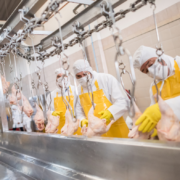Farmworkers and COVID: ‘A ticking time bomb’
It’s been referred to as a “ticking time bomb,” the coronavirus and its potential impact on farmworkers—the incredibly hard-working men, women, and children who pick our fruits and vegetables and provide other essential agricultural work. Farmworkers are notoriously underpaid for dirty, back-breaking work and now face great risk from COVID-19.
Farmworker advocacy groups that National Consumers League (NCL) works with or supports—such as Farmworker Justice, the Coalition of Immokalee Workers, the United Farmworkers of America (UFW), the Farm Labor Organizing Committee, and a national cadre of legal aid attorneys—have spent recent months strategizing about ways to protect this community that is especially vulnerable to the virus.
Farmworkers are poor, with extremely limited access to health care and, due to their poverty, often report to work despite illness. The risks of an outbreak are especially great because workers often toil in close physical proximity to one another as they harvest, ride to the fields in crowded buses and cars, have limited access to sanitary facilities, including hand-washing, and often live in overcrowded, dilapidated housing.
Despite their essential contributions to the economy, farmworkers have been cut out of the emergency relief packages. The Trump Administration has even revealed plans to lower pay for agricultural guest workers who sacrifice home and family to come to the United States to perform arduous farm labor. Advocates fear that decreasing guest worker wages would drive down wages for farmworkers already living and working in the United States.
The majority of farmworkers are immigrants from Mexico or are the children of Mexican immigrants, often socially isolated from mainstream America. Poverty forced many farmworkers to leave school at an early age. It also causes them to bring their children to work in the fields so that child labor can supplement their meager incomes. Language and cultural barriers further their isolation. NCL, through the Child Labor Coalition (CLC), which it founded and co-chairs, continues to work to close the loopholes in labor laws that allow children in agriculture to work at early ages—often 12—and to begin performing hazardous work at age 16.
“When the virus began to move into America’s rural areas, many socially- and culturally-isolated farmworkers hadn’t heard about the virus,” said Reid Maki, director of child labor issues and coordinator of the CLC. “Some were confused that the grocery store shelves were empty and that the bottled water they usually buy suddenly cost much more. In some cases, farmworkers are not being told about the virus or the need to take special precautions while working.”
Farmworkers face an alarming dearth of protective equipment. Many farmworkers groups, are urgently racing to provide masks and other protective gear.
A farmworker with COVID-19 is unlikely to know he or she has it and, therefore, very likely to keep working and infect their family and coworkers. Recently, a growers group tested 71 tree fruit workers in Wenatchee, WA. Although none of the workers were showing symptoms of COVID-19, more than half tested positive!
Concerned about these developments, the CLC wrote letters in May to several appropriators and the Committee on Agriculture, asking for additional nutritional and childcare resources for farmworker families.
Box: How to get involved
- Sign the Food Chain Workers Alliance to urge Congress to include resources for food chain workers.
- Sign UFW’s petition urging Congress to stop Trump Administration efforts to lower wages for agricultural guest workers.
- Make masks and send them to farmworker groups in your state.
- Urge congressional representatives to fund farmworker relief efforts.


















